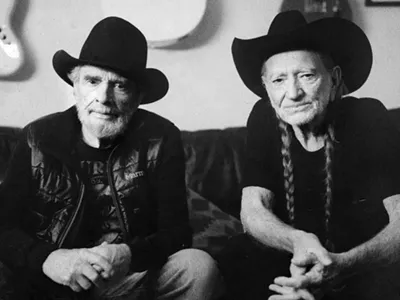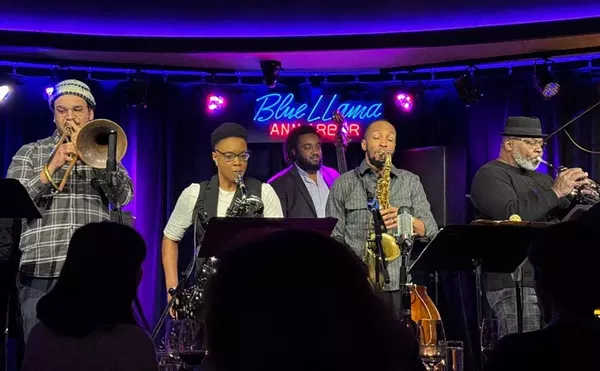If you've ever wondered what Albert Hammond Jr.'s contribution to the Strokes is, just take a listen to his new album Momentary Masters (Vagrant). That highly rhythmic Strokes guitar style? Here it is front and center, only now in a different context. That band's longtime second guitarist has come a long way since their 1998 debut Is This It. This is his third full-length under his own name. But it's the first since the longtime New Yorker moved to upstate New York, got hitched, and got sober.
After bonding with his backing band while touring on the 2013 solo EP AHJ, he brought the group to his converted barn upstate. They set to work recording with Hammond's longtime collaborator and frequent Strokes producer Gus Oberg. Hammond reports feeling both more present and more relaxed during the process. And that revitalizing energy shines through the whole record.
The fleeting nature of our very existence was a big inspiration for Momentary Masters. Hammond took the title from a quote from Carl Sagan's Pale Blue Dot: A Vision of the Human Future in Space: "The earth is a very small stage in a vast cosmic arena. Think of the rivers of blood spilled by all those generals and emperors so that in glory and in triumph they could become the momentary masters of a fraction of a dot." We spoke with Hammond Jr. in advance of his band's show at St. Andrew's Hall on Wednesday, Sept. 16.
Metro Times: How has your songwriting process changed since getting sober?
Albert Hammond Jr: The biggest difference that I've felt is that I went back to [what] I fell in love with [about] songwriting and playing guitar. I think I lost that idea for a while. I had forgotten it, or it was buried somewhere. It just came back to a more enjoyable place, where creating something is more fun. You almost have to let yourself make a fool of yourself to try to find where you're going. That's how I navigate it. And for these people to see the whole process, that was a big thing for me. To be serious, but to not take things so serious all the time. It's a balance that's really great, and I feel that only happened when I was able to stop being so emotional from drug use.
MT: Did producer Gus Oberg keep you serious? Did he challenge you through the recording process?
Hammond: Yeah, but that is kind of the trick with us. When you hang out with someone a lot, it can go either way. You can just get a lot of yes people, and 'Everything sounds great,' when it might not. It was fun to know that I could have worked on something [for] a long time, and it could have been crap and that I was going to be told that [laughs]. [Gus] picked the right time to [produce] it because I was ready to do it. All the things that we've changed and all the things we were sure of were definitely the best things I've done creatively. I'm now more curious how the next one would go because of all these things that I've learned and overcome.
MT: What was the recording process like?
Hammond: We started with one week in the end of summer, and did three weeks with the band. One week in the summer, one week in September, one week in December. And I did about three weeks alone with Gus— six weeks in total, quite quick.
I used to just burn out and never want to do any of this ever again. Now, I like working in chunks and just taking a break. The process can't be like you're trying to change something overnight. That's what feels fun about where I am now: I can tell myself somewhat wise things even though I still make the craziest mistakes. My creative side has become a lot bigger and less narrowed, which is exciting. My mind is definitely on music, my greatest love. It's what I would do even if I wasn't doing it. I can't help it; eventually something comes and I get excited about a melody.
Also, I've written a script for a movie. I was trying to go on this motorcycle adventure.
MT: How long have you been a rider?
Hammond: I started riding dirt bikes when I was 15. I had a little 50cc I called 'The Mighty Chicken.' It was bright yellow. I stopped riding for a bit, and then a friend got this Ducati and let me ride it. And I just fell back in love. My wife, she loves riding on the back with me and going places. That's how we bonded when we first met. We would just go around to farms in New York state, pick up vegetables and fruit for the week in a backpack. I never realized I was so into these kinda things until I got sober. I was like, 'Oh man, I really like doing stuff like this, getting up at six in the morning and going on a ride when no one's around.'
MT: What does rock 'n' roll mean to you today and what will keep it relevant?
Hammond: Something that just makes you feel alive. I'm just trying to describe how I felt when I was a kid and I first heard it. Those emotions are always going to be relevant.
MT: About that initial feeling and inspiration when you were younger, do you feel like that's still the same kind of energy you're tapping into today?
Hammond: I've never felt more in touch with what I originally wanted to do. I don't know where it will end. I've never felt closer to that dream, the feeling of wanting to create certain sounds, or move people in a certain way.
MT: Do you feel like this is going to be a really creatively productive time in your life?
Hammond: Yes. You feel something in your gut, and you go with it. Just try to enjoy every moment, because I know if I start [thinking] too far [ahead] then I forget about what's happening now. It's hard to balance that in my head. I have an extreme personality. I dream very big.
MT: Have you ever made apple pie from scratch?
Hammond: No, but I've eaten apple pie from scratch. Or maybe it was an apple crumble. It was delicious though.






